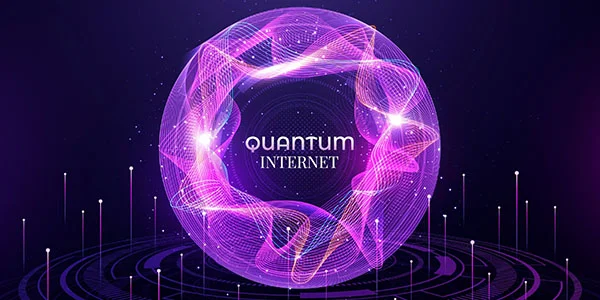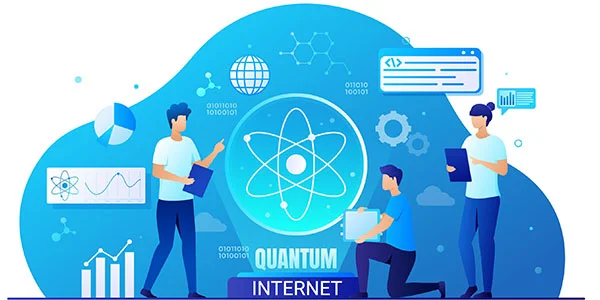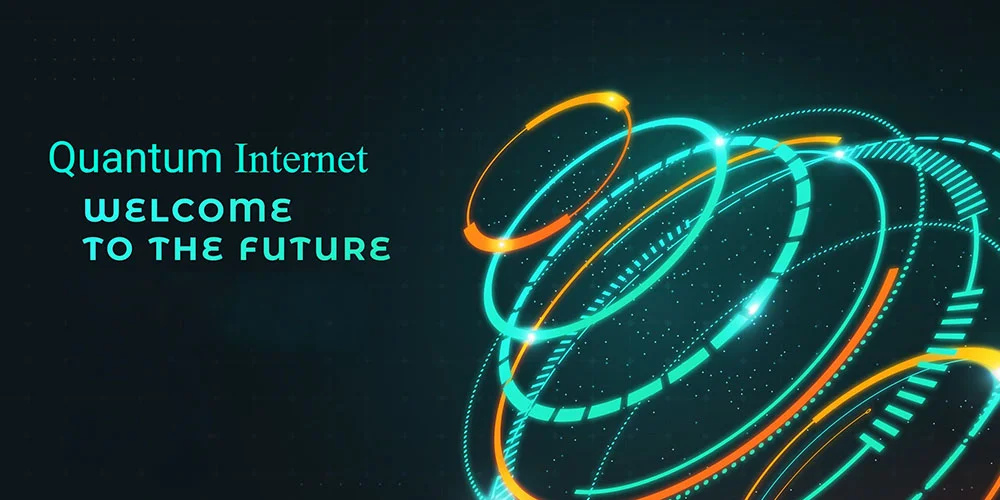Quantum Internet: The Future of Ultra-Secure Communication, is a theoretical network that uses the principles of quantum mechanics to enable highly secure and advanced forms of communication and information processing. It is designed to transmit and process quantum information, which includes quantum bits or qubits, through quantum communication channels.
History of Quantum Internet
As of my last knowledge update in September 2021, the concept of a quantum internet was still in its early stages of development, and it had not yet been fully realized. However,
I can provide an overview of the history and progress up to that point.
- Early Theoretical Foundations: The idea of a quantum internet can be traced back to the early development of quantum mechanics in the early 20th century. Quantum mechanics, formulated by physicists like Max Planck, Niels Bohr, and Werner Heisenberg, provided the theoretical foundation for quantum information science.
- Quantum Key Distribution (QKD): In the 1980s and 1990s, the concept of quantum key distribution (QKD) was developed. QKD allows two parties to communicate securely by using the principles of quantum mechanics to generate encryption keys. Researchers like Charles Bennett and Gilles Brassard developed some of the early QKD protocols.
- Quantum Teleportation: In 1993, Charles Bennett, Gilles Brassard, and others developed the concept of quantum teleportation, which involves transmitting the quantum state of one particle to another particle in a distant location. Quantum teleportation is a fundamental building block for quantum communication.
- Quantum Repeaters: Quantum repeaters are devices designed to extend the range of entanglement in quantum communication systems. In the early 21st century, researchers began developing quantum repeater protocols to enable long-distance quantum communication.
- Quantum Networking: The idea of a quantum internet, which involves the interconnectedness of quantum devices and quantum computers, gained prominence in the 21st century. Several research initiatives and organizations started exploring the practical aspects of building a quantum internet.
- Development of Quantum Nodes and Quantum Computers: Advances in quantum technology, such as the development of quantum nodes and quantum computers, have been crucial for the quantum internet’s development. Quantum nodes are essential components for quantum communication, while quantum computers can process quantum algorithms for tasks like secure key distribution.
- Quantum Satellites: Experiments involving quantum communication via satellites have been conducted, most notably by China with its Micius satellite. This has opened up the possibility of creating a global-scale quantum communication network.
- Quantum Internet Research: Research initiatives and collaborations between academia, government agencies, and private companies have accelerated the development of the quantum internet. Various testbeds and experimental quantum networks have been set up to explore its potential applications.
It’s important to note that the development of a quantum internet is an ongoing process, and many technical challenges remain to be addressed. However, the potential benefits in terms of secure communication, distributed quantum computing, and quantum-enhanced sensing make it an area of active research and development. Progress may have occurred since my last update, so I recommend checking the latest sources for the most up-to-date information on the status of the quantum internet.

Types of Quantum Internet
As of my last update in September 2021, there are several conceptual types or components of a quantum internet that researchers were exploring. These types are not mutually exclusive and can be combined to create a comprehensive quantum internet.
Here are some of the key types:
- Quantum Key Distribution (QKD) Networks: Quantum Key Distribution networks are one of the foundational elements of a quantum internet. These networks use the principles of quantum mechanics to securely distribute encryption keys between two parties. QKD ensures that the keys exchanged are immune to eavesdropping and interception.
- Quantum Teleportation Networks: Quantum teleportation networks involve the transmission of quantum states between distant locations. This technology is fundamental for quantum communication and for building more advanced quantum networks.
- Quantum Repeaters: Quantum repeaters are devices or protocols designed to extend the range of entanglement in quantum communication systems. They enable long-distance quantum communication by breaking up the communication link into smaller segments and then “repeating” or refreshing the entanglement over each segment.
- Quantum Nodes: Quantum nodes are devices that can generate, store, and manipulate quantum information. These nodes serve as the building blocks for quantum networks, allowing the processing and distribution of quantum states.
- Quantum Satellites: Quantum satellites are a component of a quantum internet that involves the use of satellites to establish global-scale quantum communication. Experiments have been conducted with the goal of enabling secure communication between locations on Earth using satellites to transmit quantum information.
- Quantum Cloud Computing: Quantum internet can integrate with quantum cloud computing, where quantum computers and quantum processing units are interconnected through the quantum network. This enables distributed quantum computing and the execution of quantum algorithms on remote quantum processors.
- Quantum Sensors and Metrology: Quantum sensors and metrology involve using the quantum internet to enhance precision measurements, such as in the fields of navigation, geology, and fundamental physics. Quantum entanglement and quantum-enhanced sensing can provide unparalleled measurement accuracy.
- Quantum Secure Multi-party Computation: Quantum internet can facilitate secure multi-party computation, allowing multiple parties to jointly compute a function over their inputs while keeping those inputs private. This has potential applications in secure voting, financial transactions, and more.
It’s important to note that the development of a quantum internet is an evolving field of research, and these components may evolve and expand as technology advances and researchers make new discoveries. Progress in this area may have occurred since my last update in September 2021, and I recommend consulting the latest sources for the most up-to-date information on the types and capabilities of a quantum internet.
Features of Quantum Internet
A quantum internet, if fully realized, would have several distinctive features that set it apart from classical (non-quantum) communication systems. These features are made possible by the principles of quantum mechanics and can revolutionize various aspects of communication and information processing.
Here are some of the key features of a quantum internet:
- Unconditional Security: Quantum Key Distribution (QKD) allows for the exchange of encryption keys with unconditional security. The security of the keys is guaranteed by the fundamental principles of quantum mechanics, and any eavesdropping attempts would be detected.
- Quantum Entanglement: Quantum internet networks rely on quantum entanglement, a phenomenon where the properties of particles are correlated regardless of the distance between them. Entanglement enables the creation of qubits with shared properties, which can be used for secure and instantaneous information transfer.
- Superposition and Coherence: Quantum internet networks can transmit qubits in a superposition of states, enabling the encoding of more information per qubit. Coherence, which allows qubits to maintain their quantum states over longer distances, is crucial for preserving the integrity of quantum information.
- Long-Distance Communication: Quantum repeaters are used to extend the range of entanglement, making it possible to communicate securely over long distances, even across continents.
- Quantum Teleportation: Quantum teleportation enables the transfer of quantum information from one location to another, without the need to physically transport particles. This feature is essential for building quantum networks.
- Distributed Quantum Computing: A quantum internet can connect quantum processors and quantum computers in a distributed manner. This allows for collaborative quantum computing, where complex quantum computations can be performed on remote processors.
- Global-Scale Quantum Communication: Quantum satellites have the potential to create a global-scale quantum communication network, ensuring secure communication between different parts of the world.
- Quantum-Secured Cloud Services: Quantum internet can facilitate secure cloud services by enabling quantum-secure multi-party computation. This feature can be used for secure data processing and analysis in the cloud.
- Quantum-Enhanced Sensing and Metrology: Quantum sensors connected to the quantum internet can provide highly precise measurements in various applications, such as navigation, geology, and environmental monitoring.
- Interoperability: Quantum networks can be designed to be compatible with classical communication systems, ensuring a smooth transition to quantum technologies while preserving existing infrastructure.
- Quantum Internet of Things (QIoT): Quantum internet can support quantum-enabled IoT devices, ensuring secure and efficient communication in the emerging field of the Quantum Internet of Things.
- Enhanced Privacy: Quantum communication ensures that the security of transmitted information is maintained, offering enhanced privacy and protection against eavesdropping and cyberattacks.
It’s important to note that the development of a quantum internet is still in the research and development phase, and there are technical challenges to overcome. However, the potential benefits in terms of secure communication, distributed quantum computing, and quantum-enhanced sensing make it an exciting area of exploration and innovation.
Benefits of Quantum Internet
The development of a quantum internet holds the promise of several significant benefits and transformative applications across various fields. These benefits stem from the unique features of quantum communication and information processing.
Here are some of the key advantages and benefits of a quantum internet:
- Unbreakable Security: Quantum Key Distribution (QKD) ensures secure communication with unconditional security. Any attempt to eavesdrop on quantum-encrypted messages would disrupt the quantum state, immediately alerting the parties involved.
- Secure Data Transmission: Quantum internet provides a high level of security for data transmission, making it ideal for sensitive and classified information in fields such as government, military, finance, and healthcare.
- Quantum-Secured Financial Transactions: Quantum internet can enhance the security of financial transactions and online banking, reducing the risk of data breaches and cyberattacks.
- Global-Scale Secure Communication: Quantum satellites can enable secure communication across the globe, enhancing international security and diplomacy.
- Quantum-Enhanced Sensing: Quantum sensors connected to the quantum internet can provide highly accurate measurements in fields like geology, navigation, and environmental monitoring, improving disaster prediction and resource management.
- Distributed Quantum Computing: Distributed quantum computing allows for collaborative quantum calculations over long distances. This can accelerate the development of new drugs, materials, and complex simulations.
- Secure Multi-party Computation: Quantum internet enables secure multi-party computation, which has applications in secure voting, auctions, and privacy-preserving data analysis.
- Quantum Internet of Things (QIoT): Quantum internet can support a more secure and efficient Quantum Internet of Things (QIoT), facilitating the growth of smart cities and advanced IoT applications.
- Quantum-Secured Cloud Services: Quantum-secure cloud computing ensures the privacy and security of data and computations in the cloud.
- Enhanced Privacy: Individuals and organizations can benefit from enhanced privacy and protection against data breaches, identity theft, and unauthorized access to sensitive information.
- Scientific Discoveries: Quantum internet can aid in the secure sharing of scientific data and facilitate global collaboration in research and discovery.
- Quantum Machine Learning: Quantum computing and quantum communication can be leveraged for more powerful and efficient machine learning algorithms.
- Long-Distance Teleportation: Quantum teleportation can be used to transfer quantum states between distant locations, enabling advances in quantum cryptography and quantum computation.
- Environmental Monitoring: Quantum sensors can provide more accurate and timely data for environmental monitoring, helping to address climate change and natural disasters.
- National Security: Quantum internet can enhance national security by providing secure and tamper-proof communication for government agencies and military applications.
- Technology Innovation: The development of quantum technologies for the quantum internet can drive innovation and create new economic opportunities.
It’s important to note that while the potential benefits of a quantum internet are substantial, there are still significant technical and practical challenges to overcome before a fully operational quantum internet becomes a reality. Nonetheless, ongoing research and development efforts are pushing the boundaries of quantum communication and quantum computing, making these benefits increasingly feasible.

Why do we need quantum internet?
A quantum internet is envisioned to address several critical limitations of classical (non-quantum) communication systems and enable a wide range of applications that are either impossible or significantly enhanced using quantum technologies.
Here are some compelling reasons why a quantum internet is needed:
- Unbreakable Security: Quantum Key Distribution (QKD) provides a level of security that is theoretically unbreakable due to the principles of quantum mechanics. This means that quantum-encrypted data is immune to hacking by even the most powerful computers, ensuring the highest level of security for sensitive information.
- Secure Communication: Quantum internet can secure communication channels in fields like finance, government, healthcare, and military, where confidentiality and data integrity are paramount.
- Global-Scale Secure Communication: Quantum satellites can facilitate secure global communication, making it possible for governments, organizations, and individuals to communicate securely across the world.
- Enhanced Privacy: Quantum internet can protect individuals’ privacy by making it extremely difficult for unauthorized parties to access or intercept their data, reducing the risk of identity theft and privacy breaches.
- Secure Multi-party Computation: Quantum internet enables secure multi-party computation, which is essential for applications like secure online voting, auctions, and collaborative data analysis while preserving privacy.
- Distributed Quantum Computing: A quantum internet allows for distributed quantum computing, enabling large-scale, collaborative quantum calculations that can accelerate scientific research, drug discovery, and other complex problems.
- Quantum Machine Learning: Quantum computers connected via a quantum internet can process data and run machine learning algorithms more efficiently, leading to advancements in AI and data analysis.
- Quantum Sensors and Metrology: Quantum sensors connected to the quantum internet can provide highly accurate measurements for applications such as navigation, geology, environmental monitoring, and medical diagnostics.
- Quantum Internet of Things (QIoT): Quantum internet can underpin a more secure and efficient Internet of Things (IoT), enabling applications in smart cities, autonomous vehicles, and critical infrastructure with an emphasis on security.
- Scientific Collaboration: Secure and fast data sharing across the quantum internet can promote global collaboration in scientific research, enabling more rapid progress in various fields.
- Quantum Teleportation: Quantum teleportation can enable the instantaneous transfer of quantum states, leading to advances in quantum computing and cryptography.
- Environmental Monitoring: Quantum sensors can provide critical data for environmental monitoring, helping to address climate change and natural disaster preparedness.
- National Security: Governments can leverage the quantum internet to secure their national infrastructure and communications against cyber threats and espionage.
- Innovation and Economic Growth: The development of quantum technologies, including quantum internet, can drive innovation and create new economic opportunities and industries.
While the potential benefits of a quantum internet are significant, it’s essential to note that building such a network presents numerous technical challenges, and it remains a subject of ongoing research and development. However, the potential advantages in terms of security, communication, computing, and sensing make the pursuit of a quantum internet highly compelling.
What is the future of the quantum internet?
As of my last knowledge update in September 2021, the quantum internet was still in the early stages of development, and its full realization remained a subject of ongoing research and innovation.
However, the future of the quantum internet holds great promise, and several possibilities and trends can be anticipated:
- Research and Development Advancements: Continued research in quantum technologies, quantum communication, quantum computing, and quantum cryptography will play a vital role in advancing the quantum internet. Progress in quantum hardware, protocols, and error correction techniques is expected.
- Quantum Networking Infrastructure: The development of quantum repeaters, quantum nodes, and quantum satellites will expand the infrastructure of the quantum internet, extending its range and capabilities.
- Commercialization: With growing interest from the private sector, it is likely that quantum technologies and the quantum internet will see increased commercial investment and applications. Quantum technology startups and quantum internet service providers may emerge.
- Global Quantum Networks: The establishment of global-scale quantum networks through the use of quantum satellites will enable secure and instantaneous communication across continents, with applications in finance, secure government communications, and more.
- Integration with Classical Infrastructure: Efforts will be made to seamlessly integrate the quantum internet with existing classical communication infrastructure, allowing for a smooth transition to quantum technologies.
- Quantum Cloud Computing: Quantum internet will enable quantum-secure cloud services, enhancing the privacy and security of cloud-based data and computations.
- Quantum Internet of Things (QIoT): The quantum internet will support the Quantum Internet of Things (QIoT), fostering the growth of smart cities, advanced IoT applications, and secure communication for interconnected devices.
- Quantum-Enhanced Sensing: Quantum sensors will continue to be developed, leading to more accurate and efficient measurements in areas such as geology, environmental monitoring, and medical diagnostics.
- Secure Multi-party Computation: Quantum internet will enable secure multi-party computation, facilitating applications like secure online voting, auctions, and collaborative data analysis.
- Quantum Machine Learning: Quantum computing integrated with the quantum internet will enhance machine learning algorithms, potentially leading to breakthroughs in AI and data analysis.
- Scientific Collaboration: Secure data sharing across the quantum internet will facilitate scientific collaboration and enable global advancements in research across various disciplines.
- Environmental and Societal Benefits: Quantum technologies and the quantum internet may contribute to addressing global challenges, such as climate change, disaster preparedness, and healthcare advancements.
- National Security: Governments will leverage the quantum internet to enhance national security, ensuring secure communications for military and defense applications.
The future of the quantum internet will depend on the successful resolution of technical challenges and the continued collaboration between governments, academia, and the private sector. As quantum technologies mature, we can expect to see a quantum internet that provides unprecedented levels of security and opens the door to a wide array of innovative applications across multiple domains. However, it’s important to stay updated with the latest developments in this rapidly evolving field to understand how the quantum internet evolves over time.
Internet of Things: (IoT) Benefits & Building The Urban Future





